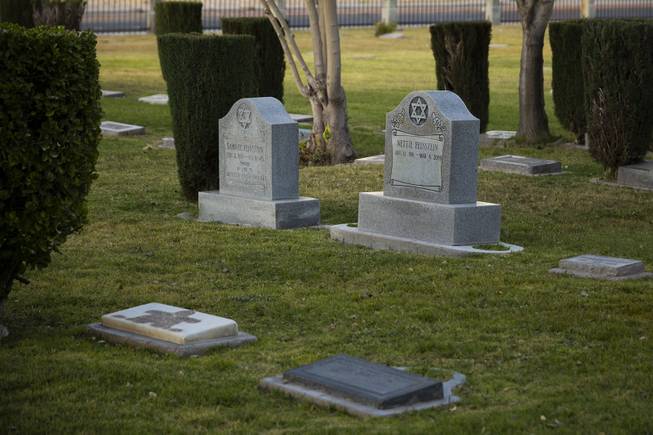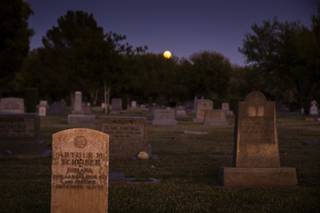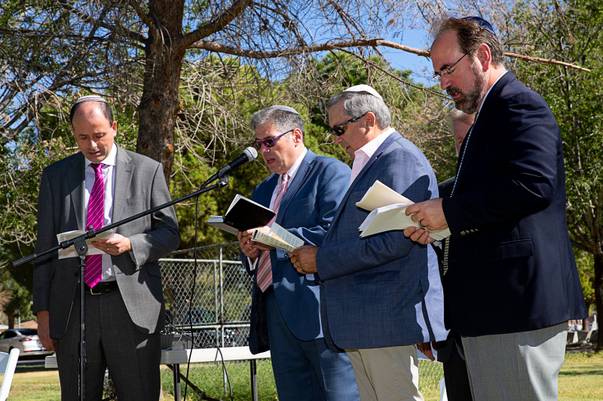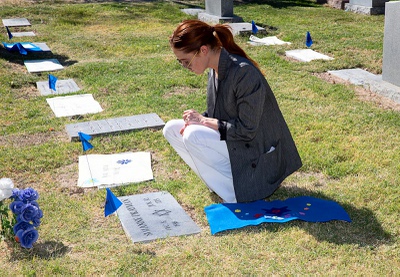
Gravestones are pictured in the designated burial space for the Jewish community at Woodlawn Cemetery in downtown Las Vegas, Saturday, Oct. 12, 2019.
Monday, Oct. 14, 2019 | 2 a.m.
For observant Jews, escorting the dead to their final resting place is considered a mitzvah, or good deed, as it’s a gesture of kindness and respect that the deceased cannot return. The headstone, traditionally unveiled after a yearlong mourning period, also has a special meaning.
“In the (Hebrew) Bible, they consider the headstone as a way of marking someone who had been buried there, it’s a sacred place,” said Rabbi Sanford Akselrad of Congregation Ner Tamid. “The memory of a person cannot be forgotten.”
From a more modern perspective, the notion of a Jewish person being buried in a grave without a headstone evokes imagery of the Holocaust, when untold numbers of victims were buried in mass unmarked graves. So when Akselrad learned that there were 64 Jews in unmarked graves at the Woodlawn Cemetery on Las Vegas Boulevard, he felt compelled to do something about it.
The discovery spurred a community-wide fundraising project to provide headstones for the deceased individuals, whose burials were in part subsidized through Clark County’s indigent burial program. The program is designed for families who can’t afford to bury their loved ones, or for individuals no longer in touch with their families. According to Clark County Social Services, about 2,000 burials a year are funded by the program.
The county typically conducts cremations, a less expensive option to in-ground burials. But cremation is forbidden in Islam and is contrary to Jewish tradition, which has prompted the county to partner with these communities to help cover the costs of in-ground burials.
But an oversight in this partnership that didn’t account for the funding of the headstones left 64 Jewish graves without headstones, so Akselrad contacted Jewish Nevada for help.
The fundraising effort, which started last year, raised more than $75,000 in individual donations between $18 and $1,800, said Marla Letizia, chair of Jewish Nevada’s board of directors. In Judaism, it’s common to give gifts in multiples of 18 because of its link to the Hebrew word “chai,” which means “life.” This is because every Hebrew letter has a numeric equivalent, and the letters that make up “chai” add up to 18.
Letizia said every board member she approached donated to the cause. After reaching out to others in the community, the group eventually raised enough money to fund headstones for the next decade. This moved her to tears, although she wasn’t at all surprised by her community’s altruism.
“Everybody realized that taking care of the dead and escorting the dead is the highest of the commandments that we as Jews live by … If someone in the community died, you would have to stop what you’re doing to answer that call. Everyone just intuitively got that,” she said.
A new contract between the county and the Jewish community, approved last summer, requires Clark County Social Services to cover the cost of the vault, the opening and closing of the grave, graveside services and the casket. Temple Beth Sholom owns a section of the Woodlawn Cemetary where the indigent burials take place and local rabbis and mortuaries donate their time and services to the burials.
Rabbi Felipe Goodman of Temple Beth Sholom said members of his congregation have donated more than 100 plots of land over the last 15 years on behalf of the temple for indigent burials.
On Oct. 6, the Sunday between Rosh Hashanah and Yom Kippur, Akselrad facilitated an unveiling ceremony of the headstones. It was a day that had particular significance to him, as it’s not only customary to visit the dead during the High Holidays, it was also his birthday.
“It was an odd choice but in reality, you get to a stage in life where you don’t want presents,” he said. “What I wanted as a gift was for people to go out and do good deeds … as a rabbi, my philosophy is that every Jew is responsible for one another.”
Representatives from the Board of Rabbis of Southern Nevada attended the ceremony, as well as three mortuaries — Bunkers, King David, and Kraft-Sussman — that have partnered with Woodlawn Cemetery to conduct indigent Jewish burials.
Akselrad said one Bat Mitzvah student painted stones for each of graves to further symbolize the permanence of memory.
Akselrad said there weren’t too many family members at the ceremony, as many of the deceased had been estranged from their families.
“You wonder, who are these people?” he said. “Some were homeless, some were on drugs, some got into trouble with the law, made bad decisions … they just had such troubled lives. That’s why they ended up here.”
Even so, it is of the utmost importance that they were all remembered, he said.
“We remember them in life and in death and that everyone has a name,” he said.



